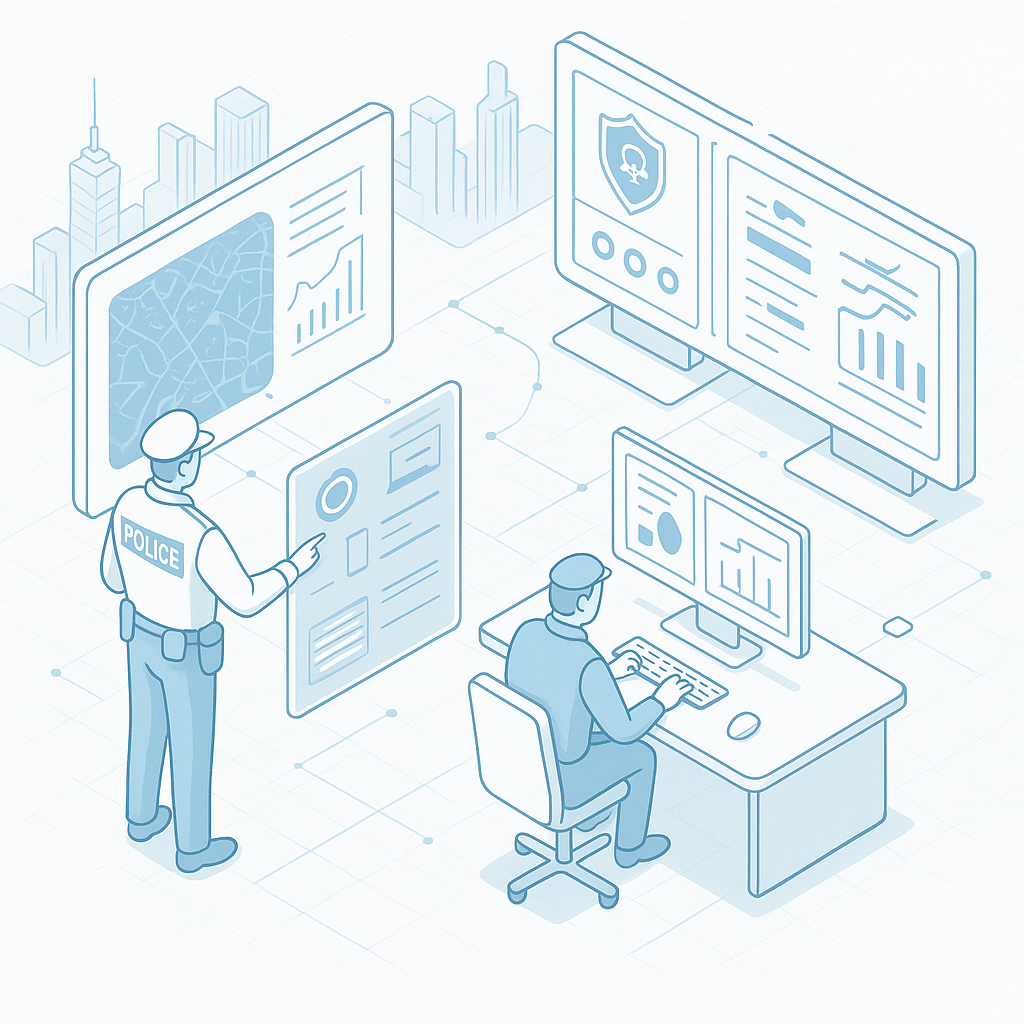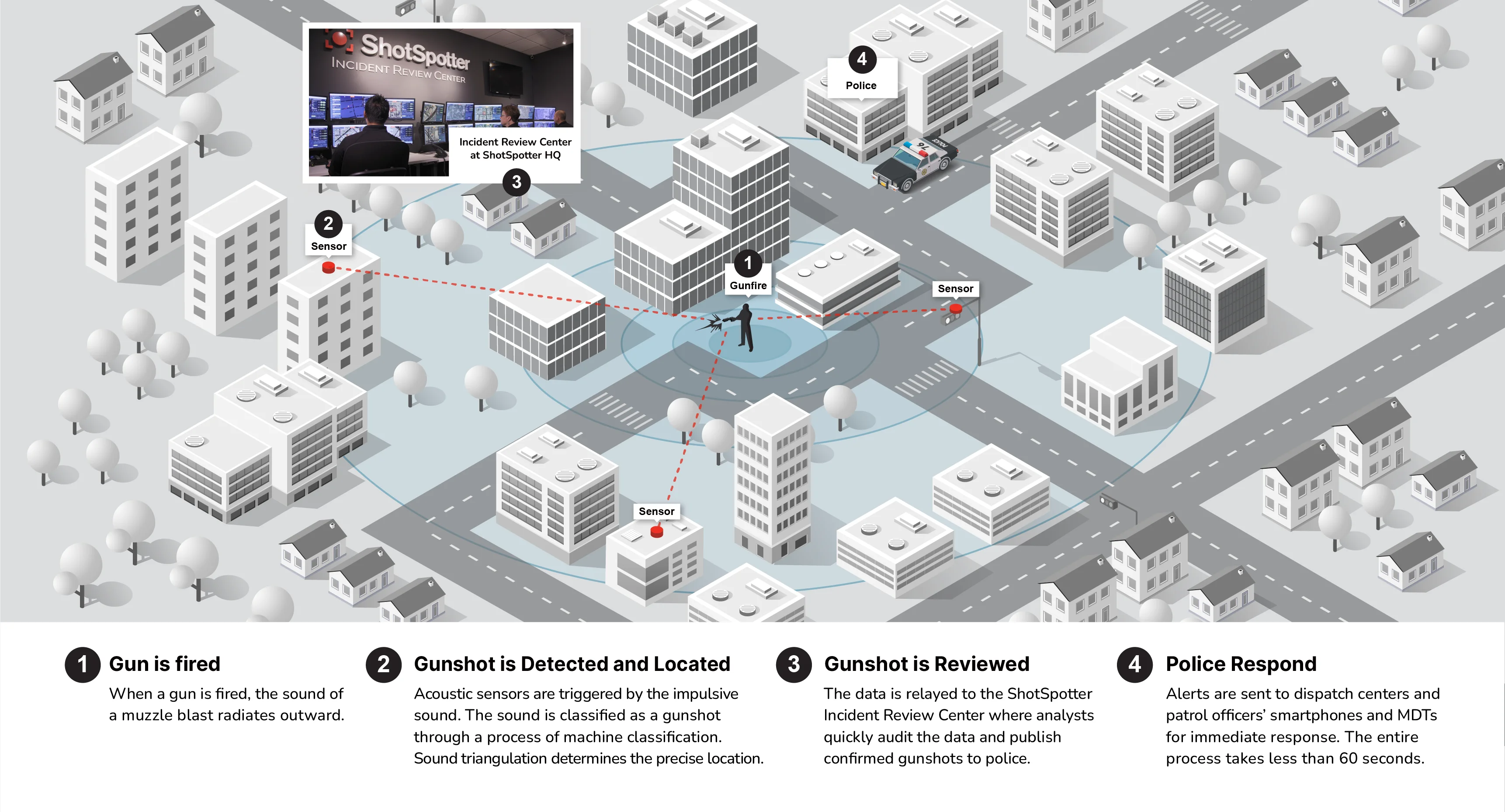SoundThinking: AI at the Intersection of Public Safety and Civil Liberties

Want to invest in SSTI?
Visit our How to Invest page to get started with platforms like Fidelity or Robinhood.
In the sprawling conversation around artificial intelligence, much of the attention — and much of the money — flows toward consumer-facing marvels like ChatGPT, image generators, and self-driving cars. But some of the most immediate, most controversial applications of AI are happening not on our phones, but on our streets.
SoundThinking (NASDAQ: SSTI) — once known only as ShotSpotter — is right at the center of that tension.
Built initially to detect gunshots in real time, SoundThinking has quietly transformed itself into a broader public safety AI platform, offering law enforcement agencies predictive tools, investigative search engines, and resource optimization systems. And lately, both investors and policymakers are paying much closer attention.
SoundThinking’s expansion into predictive policing, combined with its growing footprint in major U.S. cities, has placed it squarely in the middle of the national debate over how — and whether — artificial intelligence should be used in law enforcement.
From Gunshots to Intelligence
Founded in 1996, the company’s initial mission was narrowly focused: use acoustic sensors to detect, triangulate, and alert police to gunfire. Its flagship product, ShotSpotter, became a staple of urban policing, providing near-instant alerts when gunshots were fired, often in neighborhoods underserved by traditional emergency call systems.
For years, this acoustic detection network defined the company’s identity. But behind the scenes, SoundThinking’s leadership recognized that data — not detection — was the future.
In 2023, the company rebranded from ShotSpotter to SoundThinking, signaling a shift from hardware and alerts toward comprehensive, AI-driven public safety ecosystems.
Today, SoundThinking’s suite includes:
- ShotSpotter for gunshot detection
- CrimeTracer, an AI-enhanced law enforcement search engine, helping officers connect suspects, vehicles, and locations across disparate databases
- CaseBuilder, a digital case management system with automated workflows and AI-assisted report generation
- ResourceRouter, a predictive analytics tool that optimizes patrol routes based on historical crime data and AI-driven risk models
Together, these tools aim to not just react to crime, but predict, analyze, and even prevent it.

Why SoundThinking Is in the News Now
In 2025, SoundThinking has emerged as a critical player in the growing landscape of AI-assisted public safety — and not without controversy.
The company recently announced a series of major wins:
- Expanded contracts with New York City, Chicago, and Detroit-area municipalities, not just for gunshot detection, but for their full public safety platform, including CrimeTracer and ResourceRouter.
- Stronger-than-expected Q1 financial results, posting ~15% revenue growth year-over-year despite a challenging macro environment.
- Renewed partnerships with federal agencies for pilot programs blending predictive policing with resource optimization.
Importantly, SoundThinking’s revenue model is shifting from one-time deployments toward recurring software subscriptions, giving it stronger margins and long-term visibility.
At the same time, the company’s work — and the broader idea of AI in policing — is increasingly under the microscope.
Civil liberties groups, academic researchers, and journalists have raised concerns about bias in predictive policing algorithms, lack of transparency, and the risk of over-policing marginalized communities.
SoundThinking now finds itself navigating the tricky waters between technological innovation and public trust — a balancing act that could determine not only its future growth but also its broader role in the evolving AI ecosystem.
The National Debate: AI, Law Enforcement, and Civil Liberties
At the heart of the controversy is a fundamental question: Can AI make policing more effective without making it less fair?
Advocates argue that systems like ResourceRouter can help cities use data to deploy officers more efficiently, reduce response times, and even save lives by proactively focusing on high-risk areas.
Critics, however, warn that historical policing data often reflects systemic biases — and that algorithms trained on biased data may perpetuate or even amplify those disparities.
They also point out that predictive policing models are often black boxes, offering little insight into how risk scores are calculated or why certain neighborhoods are prioritized.
SoundThinking has made efforts to address these concerns. The company emphasizes:
- Independent auditing of its algorithms
- Community engagement programs before deployment
- Opt-in models for cities choosing predictive modules
- Transparency initiatives, including public-facing summaries of model logic and updates
Still, the broader societal conversation is far from settled. Several cities, including parts of California, have banned or limited the use of predictive policing tools. Others are moving forward cautiously, demanding higher standards for accountability and fairness.
For SoundThinking, the challenge is clear: grow responsibly, or risk becoming a cautionary tale of AI overreach.
Business Model Evolution: From Hardware to SaaS
Underneath the headlines, SoundThinking’s business model is undergoing a major transformation.
Historically, revenue came from installing and maintaining ShotSpotter sensor networks — a hardware-heavy, CapEx-intensive approach.
Today, the company is shifting toward software-first, subscription-based offerings. In its most recent filings:
- Over 55% of new bookings were software contracts (CrimeTracer, ResourceRouter, CaseBuilder).
- Gross margins improved to ~62%, reflecting the higher profitability of SaaS revenue.
- The company guided toward positive EBITDA in the second half of 2025, a significant milestone for a mid-cap growth-stage public safety tech firm.
This pivot mirrors a broader trend: cities are willing to pay annually for intelligence, not just infrastructure.
And while budget constraints remain a risk — especially for municipal clients — the need for more efficient, data-driven policing continues to drive demand.
Competitive Landscape: Who Else Is in the Field?
SoundThinking isn’t alone in the AI-for-public-safety space, but it does hold some distinct advantages.
Axon Enterprise (AXON), known for body cameras and tasers, is expanding into real-time policing intelligence, but focuses more on bodycam footage and case management.
Palantir Technologies (PLTR) offers advanced data fusion and analysis platforms for law enforcement, but at a much higher price point and complexity level — often suited for federal rather than municipal clients.
Veritone (VERI) works on AI transcription, redaction, and video analysis, but doesn’t offer the end-to-end field deployment that SoundThinking’s predictive tools provide.
SoundThinking’s sweet spot is being purpose-built for mid-sized and large cities that want affordable, fast-to-deploy AI-powered public safety systems without building them in-house.
The Risks: Public Perception and Political Shifts
Despite its strong technological position, SoundThinking faces meaningful risks:
- Public backlash against predictive policing could lead to canceled contracts or restrictions.
- Policy changes at the city, state, or federal level could limit deployment.
- Civil litigation or regulatory action remains a tail risk if AI systems are shown to contribute to discrimination or wrongful arrests.
- Client concentration — a handful of major cities still make up a significant portion of revenue.
How the company navigates these issues — with transparency, flexibility, and ethical rigor — will determine whether it becomes a dominant player or a niche provider.
Investor Takeaway: Real-World AI, Real-World Stakes
SoundThinking offers investors a rare glimpse into real-world AI deployment beyond the lab — AI that’s embedded into municipal budgets, lives, and governance.
It's a business operating at the bleeding edge of both opportunity and scrutiny. And while the debates around AI fairness, policing, and surveillance are far from resolved, SoundThinking's trajectory shows that demand for smarter, faster, more data-driven public safety systems is growing — not shrinking.
For those willing to engage with complexity — and invest in companies shaping not just technology, but society — SoundThinking represents a fascinating, high-stakes opportunity.
The future of AI isn’t just virtual. It’s here, on the streets. And SoundThinking is already listening.
Want to invest in SSTI?
Visit our How to Invest page to get started with platforms like Fidelity or Robinhood.
Disclosure: This article is editorial and not sponsored by any companies mentioned. The views expressed in this article are those of the author and do not necessarily reflect the official policy or position of NeuralCapital.ai.